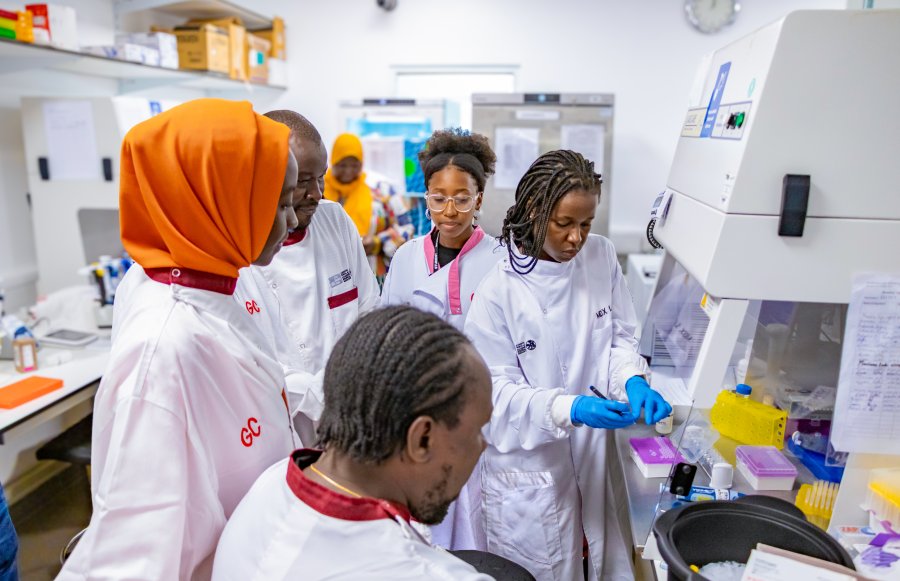Advanced Genomics and Bioinformatics: A chance to discover cutting-edge technologies
19 December 2023 London School of Hygiene & Tropical Medicine London School of Hygiene & Tropical Medicine https://lshtm.ac.uk/themes/custom/lshtm/images/lshtm-logo-black.png
The five-day course provided participants with practical experience in bioinformatics analysis using the platform EPI2ME pipeline, hands-on experience in genomics sequencing in viral and bacterial metagenomic, and wet lab training on the portable ONT MinION platform.
Dr Abdul Karim Sesay, Head of Genomics Strategic Core Platform at MRCG, stated “As part of the EDCTP funded consortium, the WANETAM network is an important collaboration between Research Institutions in eight countries in the sub-region. The MRCG genomics platform has played an important role in capacity building and training of staff and colleagues in genomics and bioinformatics as one of its cross-cutting work packages.”
He added “Most of the labs of the institutions in the network are familiar with and using the Oxford Nanopore Technologies MinION Platform. Such trainings will create a huge impact with researchers being trained to repurpose the skills, and equipment, acquired during the pandemic and allow them to be better placed for surveillance and be prepared for future outbreaks in the sub-region.”
Mr Charles Kayuki, Field Application Scientist for Oxford Nanopore highlighted the significance of Oxford Nanopore Technologies collaborating with MRCG to offer this training.
“Oxford Nanopore Technologies’ goal is to enable the analysis of anything, by anyone, anywhere. It offers an affordable, portable, and scalable sequencing solution to researchers so that they can access rich genomic insight from native or amplified DNA and RNA. A collaboration between MRCG to offer this training is part of the dedication of the two parties in empowering local communities to drive their own analyses.”
Participant Adjiratou Aissatou BA, a biologist at the Aristide le DANTEC hospital in Dakar emphasised the significance of the course and its huge contribution to epidemiological surveillance through the sharing and in-depth training provided by the genomics team.
She highlighted “MRCG has been able to establish a vast network in West Africa capable of meeting the epidemiological challenges facing the region. We are now at a stage where there is no longer any need to migrate samples.”
Penda Baboye Dembele, working at the University Clinical Research Center in Bamako, Mali was also a participant in the training and highlighted the importance of such courses stating “These courses on metagenomics and bioinformatics offer the opportunity to acquire advanced skills, explore new research perspectives and contribute significantly to the understanding of microorganisms and their impact on health and the environment. They strengthen research capabilities by filling the gap in advanced skills in key areas of molecular biology. With a focus on metagenomics, MRCG contributes to the understanding of microbial diversity, essential for addressing public health challenges. Bioinformatics courses encourage international collaboration, reduce technological dependency, and promote innovation in many sectors.”
Seyni Ndiaye, working in molecular biology and genomic platforms at IRESSEF in Senegal also took part in the training and summed up the significance of such courses, “The short-term courses at MRCG allow us to strengthen our skills on sequencing, but above all help us to have a better understanding of how the Nanopore technology works.”
He concluded looking at the importance of MRCG offering these trainings in Africa “It's also an opportunity to meet other specialists in the field from different African countries with whom we can exchange experiences that can lead to future collaborations. With the expertise of MRCG and the training and support opportunities they offer, scientists can acquire NGS technology skills that they can implement in their respective laboratories and adapt to their context.”
LSHTM's short courses provide opportunities to study specialised topics across a broad range of public and global health fields. From AMR to vaccines, travel medicine to clinical trials, and modelling to malaria, refresh your skills and join one of our short courses today.